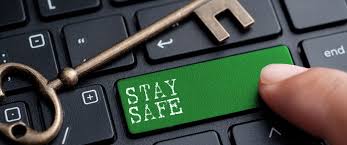
Hi there, tech savvy netizen! Before you head off to the great information superhighway in the sky, how about we give a mini talk on safety? Of course, we’ve all been warned about the nefarious individuals hiding in the dark corners of the internet, waiting to engulf our digital selves into the unfortunate group of victims of data theft, spam, and countless other online crimes and predatory practices.
But don’t fret! With a few basic steps you follow on this article, you too can peruse the web secure enough to deal with the worst offenders without even batting a single eyelid.
The Digital Dilemma: Why Online Safety Matters
Imagine this (Close your eyes. Oh, ma bad you are supposed to read this). You’re coasting along the cloud highway of cyberspace, checking your inbox, scanning social media, perhaps doing a spot of “E” shopping. Then one day you receive a pop-up notification telling you someone has hacked into your bank account, or even worse, stolen your identity. The cyber-paradise you’ve been enjoying has turned into a digital hell, and you don’t know which way to turn. Not nice, is it?
The reality, though, is that, in a global, hyper connected world, digital identities have never been safer – and your risk has never been higher. You can do something about it. Here are some simple best practices to follow, so you aren’t caught off guard, and so the bad guys will be the ones left standing on your doorstep (Not literally I hope!).
But I Have Nothing to Hide
Or perhaps you say to me: ‘You know, it’s all very well talking about all this. It sounds like a lot of work. I don’t have anything to hide, I’m just an ordinary guy (or quite possibly, guy).’ Respected sir or madam, I am distressed to inform you that it’s not about hiding – it’s about protection. And you would not leave your front door wide open, would you, leaving passers-by able to waltz straight into your hallway and help themselves to your stuff? Likewise, why leave your digital doors unlocked? Hackers and scammers are always out on the prowl, targeting the easy pickings. Why take the risk when it’s so easy to protect yourself?
Ok Let’s Dive In
Now that we’ve established why online safety is important, let’s dive into the details of how to protect yourself and your data effectively. Here are 10 things that everyone should do to protect themselves online.
Use Strong, Bastion Unique Passwords
No more ‘123456’ or ‘password123’. Choose a different mix of letters, numbers and symbols every time. You could use password generators to create your passwords such as Norton Password Generator and store them all in a password manager such as Sticky Password for extra security.
Use Two-Factor Authentication (2FA)
Two-factor authentication (2FA) is a security system that requires two separate, distinct forms of identification in order to access something. The first factor is a password and the second commonly includes a text with a code sent to your smartphone, or biometrics using your fingerprint, face, or retina. Or you could use an authenticator, such as a software-based authentication by Google. It implements multi-factor authentication services using the time-based one-time password and HMAC-based one-time password, for authenticating users of software applications.
Beware of Phishing
Watch out for emails or messages asking for login or other personal information. Be wary of clicking on links or opening attachments from unfamiliar sources. Phishing is a form of social engineering and scam where attackers deceive people into revealing sensitive information[1] or installing malware such as ransomware.
Digital housekeeping
Remember to install updates to your OS (aka operating system), antivirus, and apps on a regular basis to plug exploits and remain safe from the latest attacks. Uninstall programs or apps you are not using and also remember to change your password regularly.
Stick to Secure Wi-Fi Connections
Avoid using a public Wi-Fi network for setting up a wireless web connection while traveling; practice safety using a VPN if public Wi-Fi is the only option.
Watch What You Post
Before you put personal data (whether it’s your phone number, email address, or social security number) on Facebook or in an app or website, ask yourself: ‘Why?’ The less you share, the less hackers will have access to. Just because you have privacy settings on your Facebook pages, doesn’t mean that people can’t see things that you post, have been tagged in, or uploaded.
Keep an Eye on Your Accounts
Scan bank account statements, credit reports and online accounts regularly in case something’s a miss. Sometimes the sooner you identify the problem, the easier it is to solve.
As mentioned above have an extra layer of protection with 2 Factor Authentication to make it harder to access you account.
Lock Down Your Devices
For your smartphone, tablet and computer, use strong pass codes or bio metrics to lock them, and think about always encrypting your data on those devices.
Duplicate Your Data
If your business is targeted by a cyber attack or the hardware fails, regularly duplicating your essential files and documents between a cloud storage or external hard drive is crucial. Put in place a Disaster Recovery Plan and make sure its kept up to date.
Educate Yourself
Always keep up with current news about Internet threats and best practices. Knowledge is security’s best friend. Be sure to subscribe to my newsletter for more insights of Online security 😊
Conclusion: Surf Safely, Stay Secure
And there you have it – 10 simple practices that will help you stay safe online and protect your digital self. Online safety is not just for you, but also for your loved ones, colleagues and digital assets. Incorporate these digital practices into your online habits and posture, and let your online adventures be safe.

